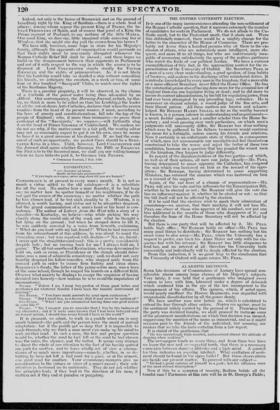CONSISTENCY.
" Servetur ad imum Qualis ab inecepto processerit—" " If you begin as a rogue, never stop short till you are hanged."
CONSISTENCY is at present in every man's mouth. It is not so much a virtue added to the old catalogue—it is a substitute for all the rest. No matter how a man flounder, if he but keep on; no matter how he spatter himself or his neighbours, if he do not quit the crown of the causeway ; no matter whither the path he has chosen lead, if he but stick steadily to it. Wisdom, it is allowed, is worth having, and virtue not to be altogether despised, but the grand commendation of a man's head or his heart is con- sistency. The author of Letters from. the West tells a story of a traveller—in Kentucky, we believe—who while picking his way charily along the sound side of the road, saw what he thought a hat lying on the ground ; but when he stooped down to lift it, he was suddenly arrested by a voice from beneath, exclaiming, " What do you want with my hat, friend ?" When he had recovered from his astonishment at this address, he was about to assist the struggling man ; but was repulsed with disdain—" No, no, friend ; I never quit the straightforward road : this is a pretty considerable deepish hole ; • but no turning back for me ! I always hold on, I guess." The all-but-smothered Kentuckian, who was determined to hold on, sink or swim, as Providence or the slough should deter- mine, was a man of admirable consistency; and, we doubt not, very heartily despised his fellow-traveller, who stepped aside from the onward path in order to insure firm footing and clean shoes. SHERIDAN'S Snake, the father of the penny-a-line men, was a hero of the same school, though he reaped his laurels on a different field. Observe what anxiety he displays to escape the suspicion of having deviated into honesty—how zealous lie is to avoid the imputation of inconsistency.
SNAKE. " Before I go, I must beg pardon of these good ladies and gentlemen for whatever trouble I have been the humble instrument of causing."
Sin PETER. " You have made amends by your open confession." SNAKE. " But I must beg, as a favour, that it may never be spoken of." Si a PETER. " What ! are you ashamed of having done one good action in your life ?"
SNAKE. " Sir, I request you to consider that T live by the badness of my character ; and if it were once known that 1 had been betrayed into an honest action, I should lose every friend I have in the world."
It is pleasant, we admit, to walk in a puddle when one is very much bemired—the path and the person have the merit of mutual adaptation : but if the puddle get so deep that it is impossible to wade through, why we think a man must e'en make up his mind to seek another road. In such a case, the fair and proper question would be, whether the road he had left or the road he had chosen was the safer, the cleaner, and the better. It seems very strange to direct the whole of our attention to the fact of his having quitted one path for another, and to leave wholly out of view a circum- stance of so much more importance—namely, whether, in so de- viating, he have not left a bad road for a good, or at the utmost, one good road for another. Your consistency-mongers give no consideration to the virtues or vices of a man's career ; their sole attention is bestowed on its uniformity. They do not ask whither his principles lead; if they lead in the direction of his nose, it matters not if they end at paradise or purgatory.


















 Previous page
Previous page